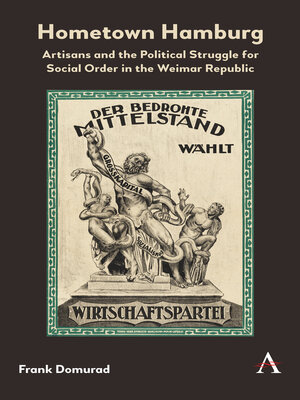Hometown Hamburg
ebook ∣ Artisans and the Political Struggle for Social Order in the Weimar Republic
By Frank Domurad

Sign up to save your library
With an OverDrive account, you can save your favorite libraries for at-a-glance information about availability. Find out more about OverDrive accounts.
Find this title in Libby, the library reading app by OverDrive.



Search for a digital library with this title
Title found at these libraries:
| Library Name | Distance |
|---|---|
| Loading... |
Through the study of Hamburg handicraft in the late Weimar Republic "Hometown Hamburg" addresses three intertwined problems in modern German history: the role of institutionalized social, political and cultural continuity versus contingency in the course of modern German development; the impact of conflicting notions of social order on the survival of liberal democracy; and the role of corporate politics in the rise of National Socialism. It provides a theoretical and analytical framework for reintroducing the notion of historical continuity in the study of modern German history. The book also supports the recent challenges to the notion of Hamburg as a liberal economic and political bastion, a "London on the Elbe," in a nation of conservative and authoritarian governmental regimes. Hometown Hamburg demonstrates why "liberal" and "socialist" Hamburg also remained a hotbed of corporate radicalism and underscores the fact that National Socialism was the only political party that presented a coherent vision of a corporate "good society," thereby making it attractive to hometown voters across the entire social spectrum in Hamburg (and in Germany).
|'Hometown Hamburg' explores the problem of social order in modern German urban history. It argues that institutionalized normative structures are the bedrock of temporal continuity in German history. In an era of various linguistic and cultural 'turns' historians have lost the theoretical and analytical ability to explain events over the long term. Their accounts and explanations of human activity and historical processes usually rest on an unexamined behaviourist psychological model where simple instrumental self-interest drives individual decision-making. As a result they reduce communal social action to individual preferences conditioned by external contingent events.
Such an epistemological viewpoint has prevented historians from taking seriously the notion and reality of a 'bürgerliche' social order, not in the sense of a bourgeois-dominated class system, but in terms of what the historian Mack Walker has defined as a "hometown" conception of communal solidarity. Belief in the value of a bürgerliche social order has provided the institutionalized basis for the remarkable continuity of German and Hamburg handicraft over time. Its norms and values have been shared by forces from all strata of society, who, like artisans, were committed to a 'rooted' notion of local community that in Walker's terminology preserved the 'webs and walls' of occupational estate cohesion and parity in the face of 'outsiders' (Standeslose) or 'disturbers' (Störer).
The corporate politics of both occupational estate and the bürgerliche social order in which it was embedded played a key role in the collapse of the Weimar Republic and the rise of National Socialism, and may yet endanger democracy in Germany once again. The division of Hamburg and Germany into irreconcilable social and moral trenches, to use Jürgen Kocka's trenchant phraseology, based on adversarial images of social good and social community, produced, in the words of the sociologists Rainer C. Baum and Frank J. Lechner, a society of extreme 'value dissensus', whose members were essentially 'moral strangers' to each other. It was in this anomic context that National Socialism became an acceptable political alternative. Nazi spokesmen intrinsically understood the meaning of Walker's 'webs and walls' of local community and opposed those whom they defined as disturbers of domestic peace and social harmony. National Socialism was able to offer a cross-section of social and economic groups, stretching in a city-state like...







